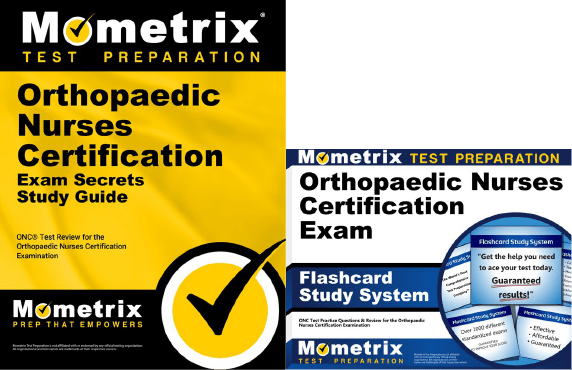If you need help studying for the Orthopaedic Nurse Certification (ONC) exam or just want some more information about what the test is like, you’ve come to the right place.
Click below to take a free ONC practice test!
Exam Eligibility
Before you can register to take the Orthopaedic Nurse exam, you’ll have to meet the requirements below:
- You need a valid RN license with at least two years of RN experience
- You need a minimum of 1,000 hours of orthopaedic nursing experience within the last three years
If you meet these requirements, you’re set to begin the registration process!
What’s on the Exam?
First, let’s talk about the questions on the exam. There are 150 multiple-choice questions total, but only 135 of the questions will count toward your score. Why is that?
The 15 unscored questions on the exam are called “pilot” questions. These are added to the exam to determine if they’re good enough questions to add to future versions of the test.
The trick is that you won’t have any way of knowing which questions are scored and which ones are pilot. They will appear just like the scored questions throughout the test.
The time limit for the exam is 3 hours. There aren’t any scheduled breaks, but you’re free to take restroom breaks as needed.
The questions on the exam are grouped into eight sections based on types of condition:
1. DEGENERATIVE DISORDERS
51 scored questions
- Osteoarthritis
- Degenerative disc disease
- Spinal stenosis
- Degenerative spondylolisthesis
- Cervical spondylosis
- Hip dysplasia
- Knee osteoarthritis
- Facet joint arthritis
- Rotator cuff arthropathy
- Degenerative meniscus tears
- Herniated discs
- Chondromalacia patellae
- Degenerative joint disease
- Labral tears of the hip
- Vertebral compression fractures
- Degenerative changes in the hand and wrist
- Sacroiliac joint dysfunction
- Degenerative muscular disorders
2. ORTHOPEDIC TRAUMA
26 scored questions
- Fractures
- Dislocations
- Sprains and strains
- Compartment syndrome
- Open fractures
- Pelvic fractures
- Femur fractures
- Spinal cord injuries
- Multiple trauma management
- Soft tissue injuries
- Bone healing
- Post-traumatic arthritis
- Rehabilitation after trauma
- Emergency management of orthopedic injuries
- Fracture complications
3. SPORTS INJURIES
15 scored questions
- ACL injuries
- Meniscus tears
- Rotator cuff tears
- Tendonitis and bursitis
- Stress fractures
- Patellofemoral pain ayndrome
- Achilles tendon injuries
- Shin splints
- Shoulder dislocations
- Lateral epicondylitis (tennis elbow)
- Medial epicondylitis (golfer’s elbow)
- Hamstring injuries
- Ankle sprains
- Concussions
4. INFLAMMATORY DISORDERS
11 scored questions
- Rheumatoid arthritis
- Psoriatic arthritis
- Ankylosing spondylitis
- Systemic lupus erythematosus (SLE)
- Gout
- Reactive arthritis
- Septic arthritis
- Polymyalgia rheumatica
- Vasculitis
- Juvenile idiopathic arthritis
5. METABOLIC BONE DISORDERS
12 scored questions
- Osteoporosis
- Osteomalacia
- Paget’s disease of bone
- Hyperparathyroidism
- Hypoparathyroidism
- Rickets
- Vitamin D deficiency
- Bone density testing
- Calcium metabolism disorders
- Phosphorus metabolism disorders
- Renal osteodystrophy
- Thyroid disorders affecting bone
6. CONGENITAL/PEDIATRIC DISORDERS
7 scored questions
- Developmental dysplasia of the hip (DDH)
- Talipes equinovarus (clubfoot)
- Legg-Calvé-Perthes disease
- Slipped capital femoral epiphysis (SCFE)
- Osteogenesis imperfecta
- Scoliosis
- Juvenile idiopathic arthritis (JIA)
7. MUSCULOSKELETAL TUMORS
7 scored questions
- Osteosarcoma
- Chondrosarcoma
- Ewing’s sarcoma
- Giant cell tumor
- Metastatic bone disease
- Benign bone tumors
- Soft tissue sarcomas
8. NEUROMUSCULAR DISORDERS
6 scored questions
- Cerebral palsy
- Muscular dystrophy
- Multiple sclerosis
- Myasthenia gravis
- Spinal muscular atrophy
- Charcot-Marie-Tooth disease
Most questions are also connected to one of six types of tasks:
- Self-care (22-32 questions)
- Activity (15-25 questions)
- Nutrition (3-9 questions)
- Complications (31-41 questions)
- Pain (35-45 questions)
- Psychosocial (3-9 questions)
How to Register
Once you’ve ensured that you meet all of the eligibility requirements, you can register for the exam.
To get started, you’ll need to submit an application using the Meazure Learning Registration System. The application will ask you for your contact information and any documentation to prove your eligibility (among other things). When you submit the application, you’ll also need to submit the exam fee, which is $425.
If you’re a member of NAON, AANP, NOVA, or CONA, your exam fee is reduced to $300.
Once your application is approved, you’ll be given information on how to register for a testing appointment.
Exam Scores
The ONC exam is scored using the Angoff method.
The Angoff method involves a group of subject-matter experts taking an educated guess at the percentage of candidates who would correctly answer each question on the test. These estimates are then averaged to set the passing score.
The point of this method is to ensure the pass threshold reflects the level of knowledge or skill that’s deemed minimally acceptable for a particular profession or field.
The passing score is 97, which means you need to answer at least 97 questions correctly to pass.
Retaking the Exam
If you didn’t get a passing score on your first try, that’s okay! You can retake the test after a 90-day waiting period.
Keep in mind that you will have to pay the full testing fee every time you retake the test.
FAQs
How many questions are on the ONC exam?
The exam contains 150 questions.
What is the time limit for the ONC exam?
The exam is timed at 3 hours.
What is the passing score for the ONC exam?
You’ll need to get a raw score of at least 97 to pass.
How much does the ONC exam cost?
The exam fee is $425.



 ONC Study Guide
ONC Study Guide ONC Flashcards
ONC Flashcards